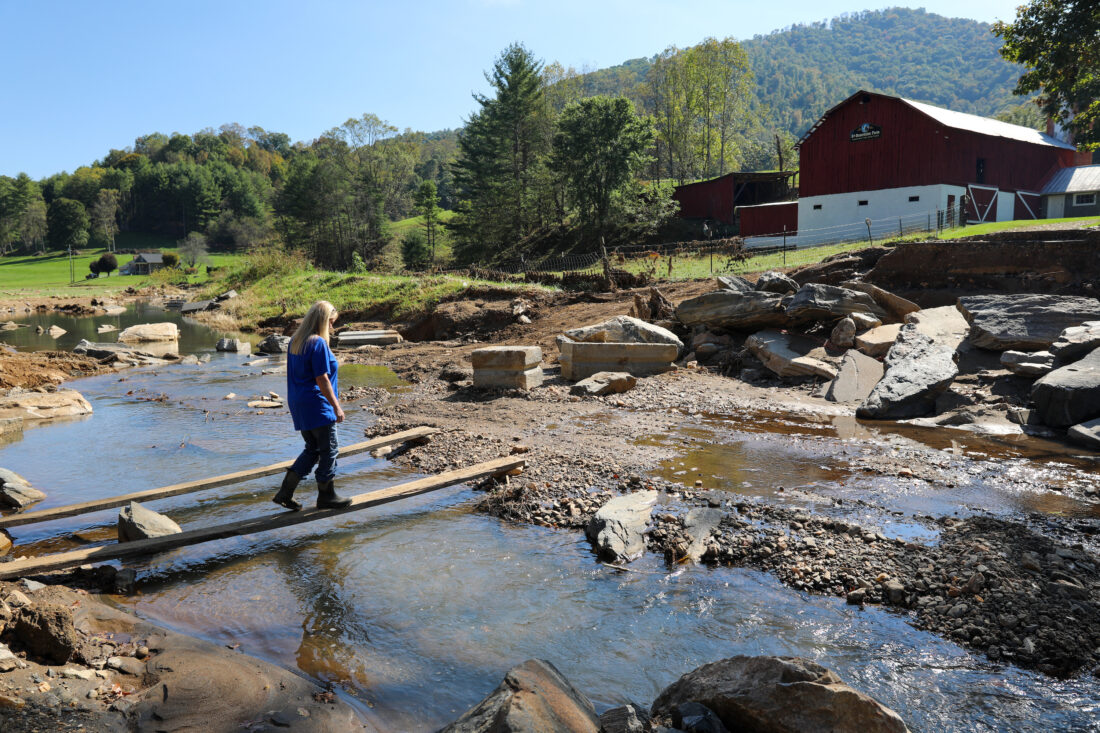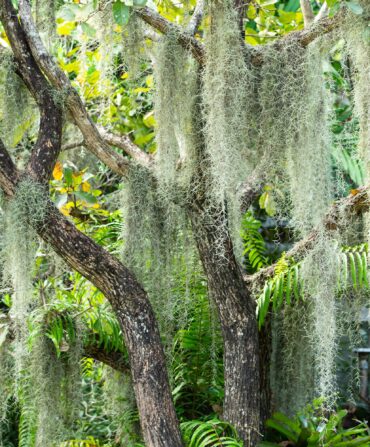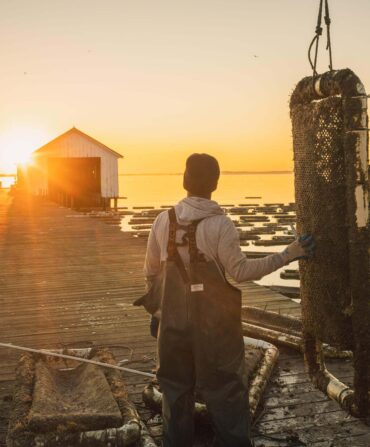Cindy Wilson’s days start when she slips on her rubber boots as the sun comes up. In rural Burnsville, North Carolina, she wades across a creek that was crossable by bridge less than three weeks ago, and treks through mud. With hay and sacks of food pellets propped up on her back, she finally reaches her herd of cattle, sheep, and donkeys.

In late September, the remnants of Hurricane Helene caused widespread destruction and at least 250 deaths across the Southeast. The hundred-mile-per-hour winds and thirty inches of rain that hit Yancey County, North Carolina, flooded Wilson’s creek, washed away her bridge, and ripped parts of the roof off her barn. For two days, the fourth-generation farmer was isolated from her animals because of all the debris on the three-mile stretch between her house and farm.
“I had no way of knowing what was going on,” she says. “I couldn’t get down there. It was really terrifying when I woke up and I saw all the water. I watched buildings and rolls and rolls of hay go down the river. I had never experienced anything like this before in my life.”
Once her neighbors and fellow farmers cleared the road, Wilson was relieved to find all her livestock safe and sound in the barn where she’d secured them before the storm. The same cannot be said for the farm itself, where Wilson now faces the challenge of getting consistent food for her nearly one hundred animals and keeping them contained after her property’s fences were destroyed.

But grassroots efforts are helping the thousands of farms in the area hit by Helene by delivering critical supplies via ATVs, cars, helicopters, and even other livestock like mules.
Almost immediately after the first reports of damage in North Carolina started spreading, organizers jumped into action. One of them, Allie Conrad, has spent the past two weeks acting as a liaison between those wanting to help and farmers in dire need of supplies. As an equine enthusiast herself in Southern Pines, North Carolina, she’s tapped into a wide network across the state, connecting local nonprofits and businesses to donors via Facebook. “We went from this panic-driven, anyway you can get supplies there, get them there to a decently oiled machine,” Conrad says.
Working with independent organizers like Conrad, regional organizations and businesses, including the WNC Regional Livestock Center, Moore Equine Feed and Pet Supply, and Sandhills Pony Club, have quickly shifted their normal operations to serve as hubs for gathering and distributing supplies, including items like goat feed and honey bee sugar water. From hay grown in Colorado to fencing sold at cost from local shops, offers of help have poured in from fellow farmers across the country.
Now that animal feed has started to consistently reach farms in the area, the most pressing need is fencing equipment. “There’s just no way to contain the animals,” Conrad says. “There are thousands of animals just wandering around these mountain territories with no fencing. And so people are trying to get their animals back and fed, and it’s a literal nightmare. How do you go find your 2,000 cows that your family is relying on to sell at a market when they’re out with 4,000 other cows? It’s just a monumental problem.”

While relief organizations have become better equipped in recent weeks to distribute supplies like solar-powered electric fencing, barbed wire, and hay, it’s the future forecast that could now throw a wrench in plans. Frost has already started to blanket the ground at Wilson’s farm, which means more water in an area that already saw nearly half a year’s worth of rainfall during Helene. Snow could come soon, too. “As the snow melts, it will cause the creeks to rise back up,” Wilson says.
Winter weather could also exacerbate other problems. For one, supplies will become harder to distribute. “It’s gonna put a halt on everybody that’s working to clear roads and getting the mudslides out of the roads that are still only accessible by ATV,” Wilson says. To maintain their body heat, livestock will need to eat more, which becomes a challenge when pasture is already caked in mud and might soon become covered in snow. “The needs of animals go up exponentially when the weather gets cold,” Conrad says.
But if the past weeks are any testament to the power of agricultural communities in Western North Carolina, organizers and farmers will adapt to the challenges of winter—as long as they have continued support.
Conrad hopes folks won’t lose focus on the devastation in the area as winter begins to conceal underlying mud and debris and media attention shifts. “We still want your help,” she says. “We still need your help. Can you wait a week? Do you have storage to store those two hundred bales you want to donate? Can you store them for a month? Because it will literally save lives if you can do that.”
As for Wilson, “Helene’s not gonna cause me to give up,” she says. “I’m going to continue on and press forward and just hope for the best.”
To stay up to date on ongoing needs in the agricultural communities of Western North Carolina, visit the Facebook pages of WNC Regional Livestock Center, Moore Equine Feed and Pet Supply, Sandhills Pony Club, and Allie Conrad. Items directly off of Wilson’s wishlist can be purchased here.








